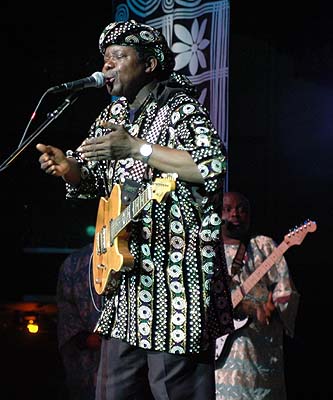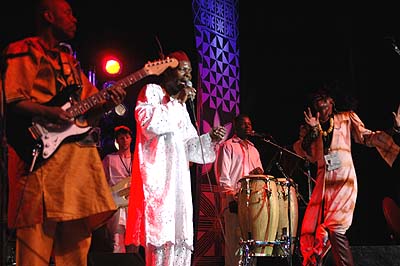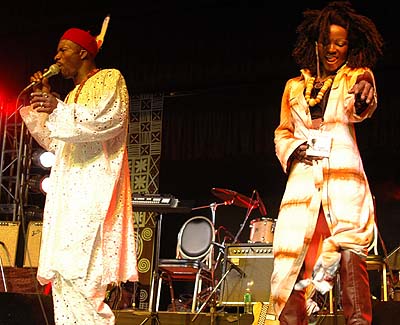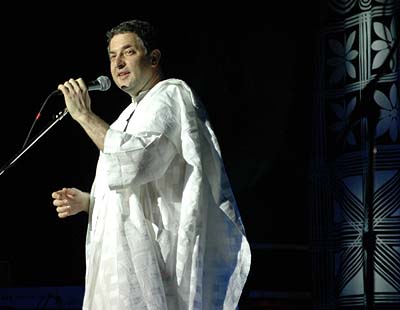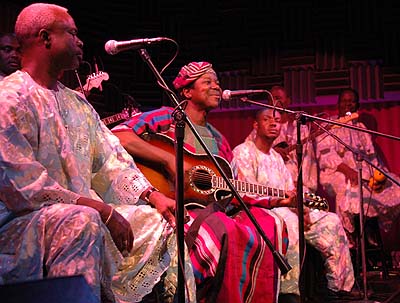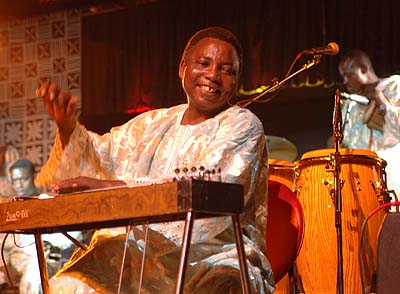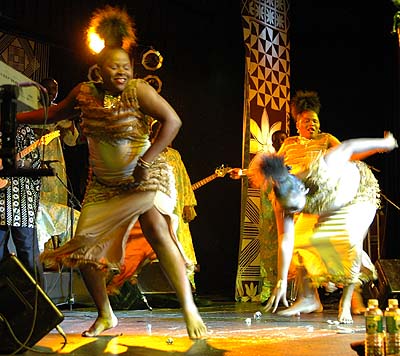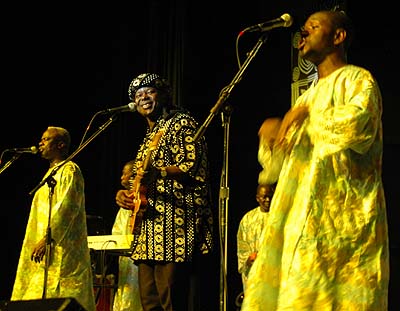The final concerts of a rare and unusual tour of live Nigerian music proved worth the effort and the wait. King Sunny Ade (KSA to fans, and "Chairman" to friends) is the reigning king of Nigerian juju music, and was an important catalyst in inspiring the creation of Afropop Worldwide. He hadn't played New York in five years; he was en route here in September 2001, but the concert was cancelled. Now, he was returning with his inimitable band The African Beats for a "Grand African Ball" at Roseland Ballroom, a show promised to last until 4:00 AM. This tour had an unlikely genesis. Three Nigerian brothers--triplets, actually--from Atlanta brought the band to the US to celebrate their 40th birthday. One thing led to another and before long the concept evolved into a mini-tour. A legendary Igbo highlife act Prince Obi Osadebe was added to the bill. Great African Balls were planned for Atlanta, DC, Philly, LA, Detroit, New York, and Chicago. These shows catered especially to Nigerian expatriates by giving them the sort of all-night bash one would find on a night crawl in Lagos. If all that wasn't enough, New York got the added treat of an intimate "palm wine" show at Joe's Pub in which KSA reminisced about his early years in the music business and recreated rootsy sounds and moments that predate his North American career by decades. This trip down memory lane proved the ultimate prize in a long, joyful, juju-highlife-palm wine weekend.
The Great African Ball: 2005
The action started at the Roseland Ballroom on Friday night, April 30, right about on time when Prince Obi Osadebe took the stage shortly after 10:00. The prince is of course the son of a highlife king, Chief Stephen Osita Osadebe, who made legendary music from the late 50s until the mid 90s. When his 11-piece band toured the US in 1994, they recorded a superb highlife blowout session released as Kedu America (Xenophile). For those in the know, expectations were high when the prince took the stage. Dressed in white with a red, white-feathered fes, Obi Osadebe cut a dashing figure, and the woman who danced alongside him through his hour-plus set was mesmerizing to watch, a writhing, Nigerian catwoman who seemed possessed by some wild spirit of sensuality as she undulated and grimaced alongside the jovial singer. The only problem was: what happened to the band? There was a guitarist, a drummer, an anglo bass player, and a talented fellow on keyboards and sax. Unfortunately, most of the music seemed to be coming from a keyboard program, making it impossible for it to breathe or truly charm.
Highlife is band music, all about interaction and mesh, and in this presentation, the magic really couldn't happen. The programmed sound tended to blur together, and while vocal melodies, guitar breaks and sax solos all stood out nicely, they had trouble getting traction in the sonic mud. Add to this the fact that the prince is not a brilliant singer in either tone or pitch, so we were mostly left with ambiance and stage spectacle, which wasn't bad, but one could have hoped for much more. Songs stretched out but had nowhere to go rooted as they were in stiff, unchanging machine rhythm.
As the highlife blasted, the hall gradually filled. Nigerians dressed in colorful finery intermingled with New York's diverse world music set. By midnight, the party was on, but the Roseland is an enormous space and at the edges of the elegant hall, one sensed that the turnout was something short of a sell out. New York's previous "Great African Balls" have presented extended performances by Youssou N'Dour, and the city's Senegalese have always turned out in numbers that overwhelmed every other demographic present. Perhaps the region's Nigerians are less willing to venture into midtown on a Friday night. (Some said a Saturday, when the Roseland was not available, would have been better. The previous Saturday in Los Angeles produced a big African crowd.) Whatever the reason, the Nigerian presence in New York was moderate at best, mostly older.
Naturally, though, the show went on undeterred, and when KSA's American manager, Andy Frankel showed up at the microphone wearing white, Nigerian traditional dress and addressed the crowd in English and Yoruba, the Africans roared. Frankel explained that the first two hours of the show would be a regular (meaning American style) concert, and that fans wishing to "dash" the musicians with money would have to wait until after that to empty their wallets and pocket books. In Yoruba, he also chided them not to dash one-dollar bills. Fives, tens, and twenties please! The Nigerians loved that, and when the time came, a few did heed the advice coming through with big bills for the king.
After all these years, there is still nothing like the thrill of watching the African Beats attack a stage, building an opening groove instrument by instrument. The talking drummers lead, followed by the other percussionists, the signature pedal steel guitar player who splits the air with his first wailing slide, two backing guitarists and a bass man, the trap drummer, backing singers, keyboardist, and ultimately, the man himself, dressed this time in black and white, his ubiquitous Telecaster guitar in hand. At 58, KSA has gained a few pounds since we saw him last, but he still puts across an amazingly youthful energy from the stage, smiling often, dancing and joking with his band mates to lend a casual feel to precisely arranged and orchestrated set pieces. The sound was good, and after Osadebe's programmed beats, it transformed the energy in the room instantly. Ade is an unfailingly warm and engaging presence on stage, and his band has a richness and consistency to it that takes you back to the first time you heard its trademark sound, whether that was a wedding in Lagos in the 70s, or one of the early-80s US tours that put the whole concept of African pop, and for many "world music," on the map to begin with.
The African Beats band was substantial as ever, 14 by my count. KSA shows of yore probably included one more guitar, and one or two more percussionists. The most noticeable change was that the four, male backing singer/dancers who usually flank the king, two on each side, were now just two, veteran Femi Owomoyela grey haired but vigorous to Ade's right, and a young newcomer to his left. The younger singer, Ade explained during the Joe's Pub show, is the grandson of the man who gave Ade his first set of musical instruments for the band back in 1966. The fluid interaction of singing and dancing between these front-line singers proved as captivating as ever, despite their reduced numbers.
The first part of the show moved briskly through songs, both familiar and unfamiliar. After all these years, the repertoire is vast. But KSA seemed to know which tunes his American fans just had to hear, and a chill passed through the crowd when a stinging guitar rang out, and the band dropped into the deep, slow, hypnosis of "Ja Fun Mi," the lead track from Juju Music ( Island 1981). This was the recording that introduced many of us to this legendary band and the song's musical power matches its nostalgia value. The dancers still do the same sweeping, circling, slow dance--like elegant birds showing off--that has always accompanied performances of the song. African Beats onstage interplay remains utterly seductive, from the synchronized moves and dances to the full-throated, off-mic singing that often begins a song, or provides an interlude between songs. Little in this band's sound and presentation has changed, and after all the evolutions, declines, "modernizations," and outright corruptions some veteran Afropop acts have undergone over the past 20 years, Ade and his band are to be commended for their fidelity to concept. Perhaps it all goes back to that moment in 1984 when Island Records tried "remixing" Ade's music. He flatly rejected the result and told them not to release it. Label and artist soon parted ways, but the juju cat was out of the bag by then. Looking back, you might say King Sunny Ade changed world music, but world music did not change King Sunny Ade.
One aspect of the present show that did not exist when the band first came stateside is the three female dancers who make occasional, dramatic appearances with fountain-like plumes of hair sprouting from the tops of their heads. When the ladies appeared at the Roseland, the male front line retreated, except when called forth one by one for a little love dancing with one of these buxom gals.
As the show unfolded, the band honed its groove, the songs got longer with more extended percussion breakdowns featuring Ade singing freeform praise and proverbs. The stage managers could only hold back the dashers for so long, and once the parade began, sometime after 1:30, it was non-stop until the end of the show. Dashing has always been an aspect of KSA's show that American audiences struggle with. The dancing and showmanship seem to vanish as the musicians settle into a deeper focus on playing their instruments, and Ade stands at stage left, playing the king while a line of patrons forms before him, and each takes his or her turn placing bill after bill on the singer's forehead, chest, arm, or simply tossing them at his feet. Most of the dashers did not follow Andy Frankel's advice, and turned up with literal bricks of one-dollar bills so that they could stand there for as long as five minutes, peeling off bill after bill.
The outsider viewing this spectacle might conclude a number of things: that the giving is more about the giver's ego than honoring Ade; that the audience is being deprived of the intended performance; and that the singer must find this whole thing soo annoying. There may be something to the first complaint; some of the dashers did seem conspicuously pleased with themselves. But these other impressions are wrong. First, this is the show, and second, KSA is completely comfortable with the tradition. In a lengthy interview with Afropop Worldwide on the Sunday after the African Ball. He talked about the roots of dashing, how it was originally done to kings, using the first form of currency, cowry shells. One of the king's attendants would string the dashed shells into a little crown the king would then wear on his head. Ade said that where the dasher places the bill says something about how he sees himself. If he is a big man, a wealthy man, a proud man, he goes for the head. If he or she is humble or lowly, the bill goes to the feet.
During the ritual, Ade digs into tradition of his own, praise singing, a central feature of his enduring reputation with Nigerians. When theAtlanta triplets who made this tour possible came onstage, Ade broke form and spoke to the crowd in English, praising them for their excellent character and work. The rest of the praising was heard only as song, and never explained, but Ade told Afropop that it's a somewhat improvisatory art in which one uses what one knows and relies on powers of observation and instinct to come up with the praises appropriate to the moment. Things seemed to be working out alright. As he was being dashed, Ade would collect a large fan of bills in his microphone hand, displaying them to the audience before letting them fall to the stage or into the hands of the band member in charge of collecting the takings, which we are told, get divided among the entire band after the show. During the hour or so of dashing I observed, bag loads of cash were carted off the stage. Fans heartier than myself who made it to the end of the show--around 4:00 AM, as promised--reported that the music got tighter and better right up to the finale. Whether you made it to the end or not, you definitely left satisfied having experienced a truly African night of entertainment. Thanks to Thomas Rome of African Hypertext for producing the Great African Ball at Roseland.
Palm Wine at Joe's Pub
The sight of KSA and the entire African Beats band standing shoulder to shoulder on the small stage before a sold-out house at Joe's Pub was worth the price of admission on its own. The musicians took the stage in their customary phased entry and when Ade reached the mic, he scolded himself for not bringing along some palm wine from home. He promised to do so next time. This opening speech, casual, spontaneous and intimate, telegraphed that the show would be different. But then one wondered as the band moved through a set of juju songs much as they would do in their regular show. The fact is, although these musicians were born and raised on palm wine (music), and know a vast repertoire of songs in the style, they virtually never perform them publicly. This show was the inspiration of KSA and his manager, Andy Frankel.
The break was dramatic when it came. Ade told the audience that when he started his career, the band recorded its first songs crowded around a single microphone. He took up an acoustic guitar and gathered the band to sing with him around that one mic. Each time they would start, he'd cut them off, playing the producer: "No. You, move back. You, come forward." This routine loosened up the crowd and even though the song never really played out in its full glory, we were now getting a glimpse into the past, and it was golden.
Ade then had the band sit down, the way they used to perform in the 50s and early 60s, and they went through a set of palm wine songs. In between, he told stories and reminisced. The songs seemed quaint, a bit tame, not to mention unpolished, in comparison with the African Beats' standard fare. But to see Ade sitting there picking out folksy, two-string guitar melodies like an old palm wine musician offered a transforming view of an African legend. It was sensational and the crowd went crazy for it. Anyone who caught KSA this time around was blessed. With obstacles mounting by the day against the possibility of such large African bands touring here, one never knows when the chance will come up again. But those who caught this remarkable hour with the African Beast were doubly blessed. One hopes Ade felt as good about the experience as the audience did, because this is something he should develop and repeat. To end the show, the band stood up again and launched into juju boogie. The dancing ladies appeared, and a few dashers, and the usual frenzy ensued. It was all the more joyous after a peak into the past into the history of one of Africa's greatest surviving roots bands.
Stay tuned for highlights of this very special concert at Joe's Pub on Afropop Wordwide's upcoming Hip Deep portrait of King Sunny Ade.







